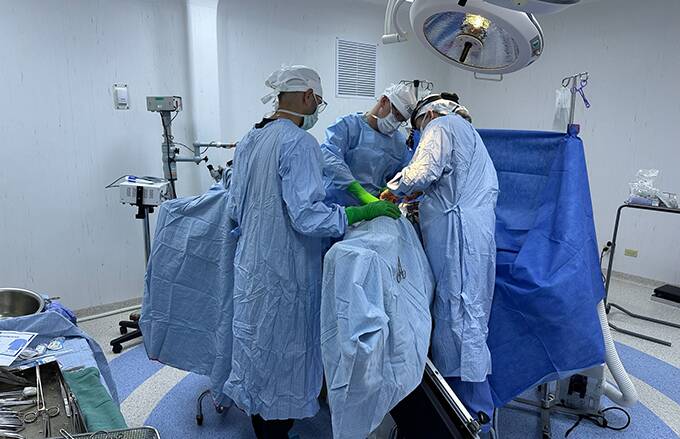October 2, 2025
The Ripple Effect of Surgery

In much of the world, access to basic surgical care is far from guaranteed. Conditions like kidney stones or appendicitis, easily treated with routine surgery in developed healthcare systems, can become life-threatening when there is no access. It’s estimated that more than 5 billion people worldwide lack access to safe, essential surgery.
That’s the gap Global Surgical Expedition (GSE) has set out to close. Founded in 2012 by Dr. David Rapp, a urologist and urogynecologist at the University of Virginia, GSE works to expand surgical access not only by providing care on the ground during missions, but also by training and equipping local teams so that skills, knowledge, and resources stay in-country long after the mission ends. They rely on donations, volunteers and partners like Standard Textile who share their vision for care and sustainability.
“Our mission is to change lives through surgery,” Dr. Rapp explained. “But changing lives can mean many things: restoring health, breaking cycles of poverty, or even reducing environmental impact.”
Stories That Go Beyond the OR
One of the stories that shaped GSE’s vision came years ago in a conversation with a patient named Anna, who was suffering from severe pelvic organ prolapse. David Rapp expected their discussion to focus on her pain and discomfort, and how surgery might improve her quality of life.
Instead, Anna explained that the hardest part of her condition was that she couldn’t work. Without income, she couldn’t feed her family, and she couldn’t afford the small monthly tuition it cost to send her daughter to school after fourth grade. Surgery, she said, would not only restore her health but also change her daughter’s future.
Stories like Anna’s inspired GSE to measure the ripple effects of surgery: how a single procedure can lift families out of poverty, extend years of healthy life, and even protect the environment.
Putting Reusables to Work
On one mission, David Rapp recalls being shown a hospital burn site where surgical waste was incinerated. Seeing disposable gowns, drapes, and needles piled and burned underscored how much the choice of surgical supplies matters. And how building surgical infrastructure can not only impact health but also protect our environment for the next generations.
That’s how Standard Textile’s reusable surgical gowns, drapes, and towels have become part of GSE’s work. During a recent mission in Belize, these products proved both practical and effective. Staff appreciated the comfort of the gowns in warm climates and the durability of the drapes and covers in supporting safe, efficient procedures.
Their impact extends beyond performance. These supplies continue to serve patients and providers after the mission ends, staying in local hospitals and available to other nonprofit medical teams who follow.
Training for the Future
The Global Surgical Expedition team on a recent mission in Belize.
A key part of GSE’s mission is training. GSE’s trips include resident education, classroom learning, and hands-on skills transfer so local surgical teams can continue providing care long after volunteers leave.
Reusable textiles fit into this model, too. Teaching sterilization and prep of reusable supplies helps hospitals in resource-constrained settings maximize what they have. As Dr. Rapp noted, “Surgery is a team effort — it’s not just the surgeon. Nurses, techs, anesthesiologists, sterilization staff — everyone matters in building sustainable systems.”
Lessons for All of Us
Beyond the amazing ripple effect that access to basic surgery can have, one of the striking lessons from GSE missions is how much can be accomplished with fewer supplies. Operating rooms in these settings run with far less waste than what’s typical in the U.S., and teams learn to maximize every resource.
Reusable surgical textiles are central to that story. They allow teams to keep working without relying on a steady stream of disposables, and they stay behind for local hospitals to use long after a mission is over. For the surgeons and residents who travel with GSE, that experience is eye-opening. They return home with a new perspective on efficiency and sustainability, realizing that high-quality care doesn’t have to come at the cost of excessive waste.
For Standard Textile, supporting GSE is a way to live our purpose of inspiring care and comfort for generations. It’s proof that even in the most challenging environments, sustainable solutions like reusables enable both efficiency and excellence in surgical care.
Looking Ahead
GSE is growing, expanding missions in Belize, Botswana, and Honduras, and developing new training models that combine in-person and virtual education. As they continue to change lives through surgery, we’re proud to play a small part in supporting their vision.
You can help too by donating to GSE.
Related Content

Reusable Surgical Gowns Show Significant Environmental Improvements Over Disposables
Surgical gown life cycle results continue the conclusions from six other reusable/disposable gown/coverall studies that show reusables provide a significant improvement in energy, environmental footprint, blue water, and energy associated emissions.

Solving Surgical Sterilization Wrapper Shortages
A global shortage of disposable sterilization wrappers for surgical equipment has recently affected hospitals and ambulatory surgery centers across the U.S., causing a demand for alternative wrapper choices for use in their sterile processing departments.

Standard Textile Provides Continuing Education at AORN Global Surgical Conference & Expo 2024
Standard Textile is pleased to once again provide continuing education as part of this year’s AORN event.